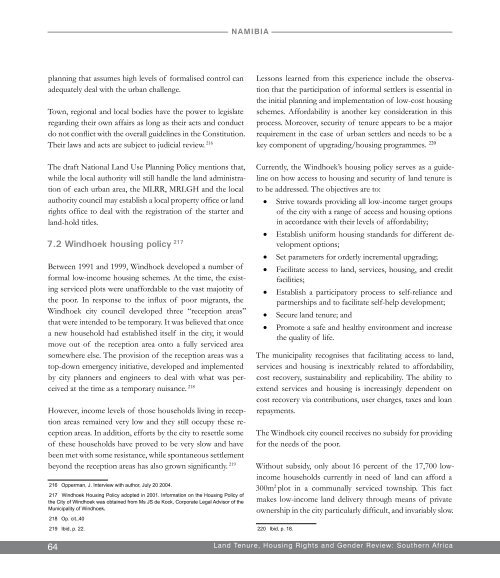N A M I B I A - UN-Habitat
N A M I B I A - UN-Habitat
N A M I B I A - UN-Habitat
- No tags were found...
You also want an ePaper? Increase the reach of your titles
YUMPU automatically turns print PDFs into web optimized ePapers that Google loves.
NAMIBIAplanning that assumes high levels of formalised control canadequately deal with the urban challenge.Town, regional and local bodies have the power to legislateregarding their own affairs as long as their acts and conductdo not conflict with the overall guidelines in the Constitution.Their laws and acts are subject to judicial review. 216The draft National Land Use Planning Policy mentions that,while the local authority will still handle the land administrationof each urban area, the MLRR, MRLGH and the localauthority council may establish a local property office or landrights office to deal with the registration of the starter andland-hold titles.7.2 Windhoek housing policy 217Between 1991 and 1999, Windhoek developed a number offormal low-income housing schemes. At the time, the existingserviced plots were unaffordable to the vast majority ofthe poor. In response to the influx of poor migrants, theWindhoek city council developed three “reception areas”that were intended to be temporary. It was believed that oncea new household had established itself in the city, it wouldmove out of the reception area onto a fully serviced areasomewhere else. The provision of the reception areas was atop-down emergency initiative, developed and implementedby city planners and engineers to deal with what was perceivedat the time as a temporary nuisance. 218However, income levels of those households living in receptionareas remained very low and they still occupy these receptionareas. In addition, efforts by the city to resettle someof these households have proved to be very slow and havebeen met with some resistance, while spontaneous settlementbeyond the reception areas has also grown significantly. 219216 Opperman, J. Interview with author, July 20 2004.217 Windhoek Housing Policy adopted in 2001. Information on the Housing Policy ofthe City of Windhoek was obtained from Ms JS de Kock, Corporate Legal Advisor of theMunicipality of Windhoek.218 Op. cit.,40219 Ibid, p. 22.Lessons learned from this experience include the observationthat the participation of informal settlers is essential inthe initial planning and implementation of low-cost housingschemes. Affordability is another key consideration in thisprocess. Moreover, security of tenure appears to be a majorrequirement in the case of urban settlers and needs to be akey component of upgrading/housing programmes. 220Currently, the Windhoek’s housing policy serves as a guidelineon how access to housing and security of land tenure isto be addressed. The objectives are to:• Strive towards providing all low-income target groupsof the city with a range of access and housing optionsin accordance with their levels of affordability;• Establish uniform housing standards for different developmentoptions;• Set parameters for orderly incremental upgrading;• Facilitate access to land, services, housing, and creditfacilities;• Establish a participatory process to self-reliance andpartnerships and to facilitate self-help development;• Secure land tenure; and• Promote a safe and healthy environment and increasethe quality of life.The municipality recognises that facilitating access to land,services and housing is inextricably related to affordability,cost recovery, sustainability and replicability. The ability toextend services and housing is increasingly dependent oncost recovery via contributions, user charges, taxes and loanrepayments.The Windhoek city council receives no subsidy for providingfor the needs of the poor.Without subsidy, only about 16 percent of the 17,700 lowincomehouseholds currently in need of land can afford a300m 2 plot in a communally serviced township. This factmakes low-income land delivery through means of privateownership in the city particularly difficult, and invariably slow.220 Ibid, p. 18.64Land Tenure, Housing Rights and Gender Review: Southern Africa
















